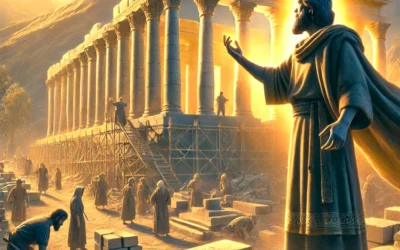The Book of Job is the eighteenth book of the Bible and part of the wisdom literature of the Old Testament.
It tells the story of Job, a righteous man who endures intense suffering and loss.
The book explores deep questions about why good people suffer, the nature of faith, and the sovereignty of God.
Job’s Righteous Life & Sudden Suffering (Job 1–2)
Job is introduced as blameless and upright, deeply devoted to God.
But in the unseen spiritual realm, Satan challenges Job’s faith, claiming that Job only serves God because of his blessings.
Key Highlights:
- God allows Satan to test Job but sets limits on how far he can go.
- Job loses his wealth, children, and health in a short time.
- Despite his pain, Job declares: “The Lord gave and the Lord has taken away; blessed be the name of the Lord.” (Job 1:21)
Lesson: True faith remains even when blessings are removed.
Job’s Friends Offer Faulty Advice (Job 3–31)
Three friends—Eliphaz, Bildad, and Zophar—visit Job and try to explain his suffering.
They insist that he must have sinned to deserve such pain, but Job defends his innocence.
Key Highlights:
- Job expresses deep sorrow and curses the day of his birth.
- His friends argue that suffering is always the result of sin.
- Job pleads for a chance to speak directly with God and understand his suffering.
Lesson: Human wisdom is limited. Well-meaning advice can be hurtful when it misrepresents God’s character.
Elihu’s Response (Job 32–37)
A younger man named Elihu speaks up, offering a different perspective.
He insists that suffering can be discipline or a test and not always punishment.
Key Highlights:
- Elihu rebukes both Job and the three friends for their flawed reasoning.
- He emphasizes that God is just, wise, and beyond human understanding.
Lesson: God may allow trials to shape us, refine us, or reveal something greater—beyond what we can see.
God Speaks from the Storm (Job 38–41)
Finally, God answers Job, not with direct explanations, but with a series of questions that highlight His power, wisdom, and sovereignty over creation.
Key Highlights:
- God asks, “Where were you when I laid the earth’s foundation?” (Job 38:4)
- He describes the mysteries of the universe and the creatures He controls.
- Job realizes his limitations and humbly submits to God’s authority.
Lesson: God doesn’t always explain our suffering, but He is always in control and worthy of trust.
Job Is Restored (Job 42)
Job repents for questioning God’s wisdom. God rebukes Job’s friends for misrepresenting Him and restores Job’s fortunes, blessing him even more than before.
Key Highlights:
- Job’s relationship with God is restored.
- He prays for his friends, showing forgiveness.
- God blesses Job with double what he had before, and Job lives a long, full life.
Lesson: Restoration and blessing often come through humility, perseverance, and trust in God—even in pain.
Final Thoughts
The Book of Job challenges us to trust God when life doesn’t make sense.
It reminds us that God is sovereign, and though we may not always get answers, we can always trust His heart.
Job’s story is one of faith refined by fire, and in the end, God proves faithful.





